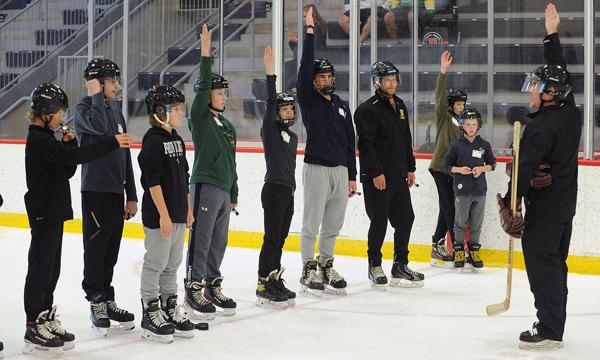The age range of the attendees was 11 to 60, but the bulk of them were 20 or younger, said Mark Verplaetse, the USA Hockey officiating program seminar coordinator for the Minnesota District.
“The idea is that we try to introduce officiating to brand new officials,” said Verplaetse, who has been refereeing hockey for 43 years.
Seminar attendees receive their certification and then are included in a comprehensive mentoring program.
There is also a significant difference between basic understanding of the rules and the knowledge needed to apply them correctly at game speed, Verplaetse said. When someone registers as a new official, a rule book is mailed to them.
“The rule book is about an inch and three-quarters thick,” he said. “It contains essentially the rules, but about three-fifths of the book is something we call a case book — situations that occur for each rule and how the rule applies to it.”
Despite her knowledge learned as a player, Fuller also frequently turns to the rule book.
“At school when they tell you to take out a free reading book, that’s the book that I take out,” Fuller said with a laugh. “I’m working on it. I wouldn’t say I have it memorized like the back of my hand, but I’m definitely working on it and that’s where I want to get to.”
Verplaetse said about 10 percent of the registered officials for USA Hockey are women, which is a number that’s grown in recent years.
“There are many girls that I’ve mentored years and years ago that have skated Olympic games and a lot of international games and stuff,” he said. “We’ve got a very good, very strong group of women here, which I’m very, very proud of.”
Fuller said she also has noticed more female officials at all levels, including the PWHL, which includes the Minnesota Frost.
“We’ve got a few in Bemidji that I look up to,” Fuller said “One of them is older than me. She graduated high school last year, I think. She ended up actually getting mentioned at a Wild game for being one of the few female officials. But I had a friend from Bemidji this year that came to the seminar with me and now it’s like it’s really growing.”
Verplaetse said events like the seminar and the constant recruiting of new officials is required largely due to the continued growth of the sport.
Occasionally, that leads to referees doing five or six games in a day, he said.
One of the more appealing parts of the seminar is that it is in person, as opposed to virtual, said Fuller, contrasting it to her elementary school experience during the pandemic.
“When I was in third grade, it’s like my grades went down because we were learning on the computer and I wasn’t in class in person,” she said. “So being able to be in person [at the seminar] and on top of that, meet NHL refs and go to a Wild game is super good.”
Despite being only 13, Fuller is able to use her voice of experience to recommend becoming a referee.
“It’s a great way to get better,” said Fuller, who also plays left wing. “It’s made me better as a player and knowing my rules and upgrading my hockey smarts.
“I’d say definitely get into reffing and go do it.”
Story from Red Line Editorial, Inc.



